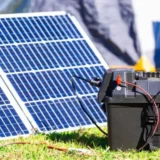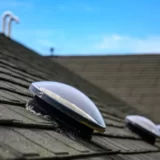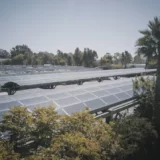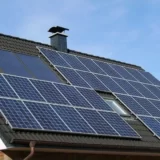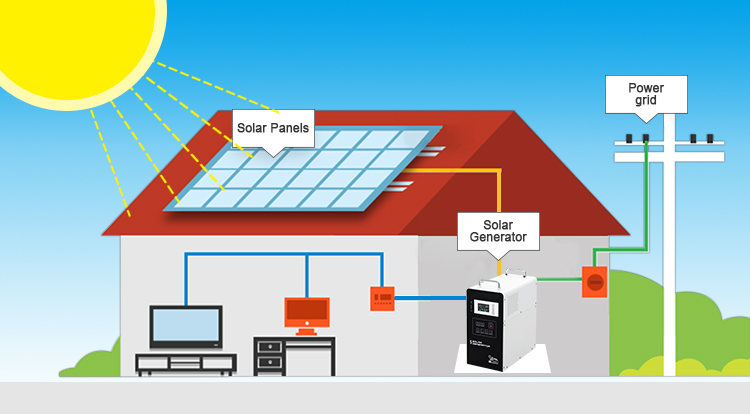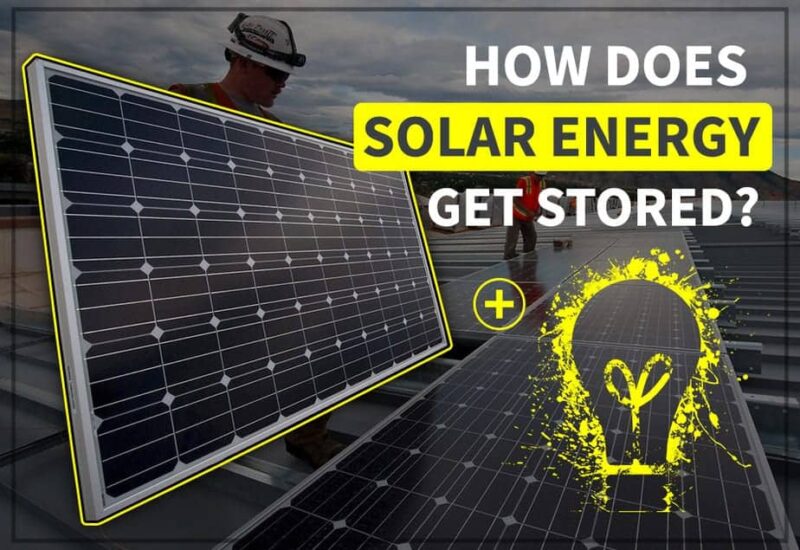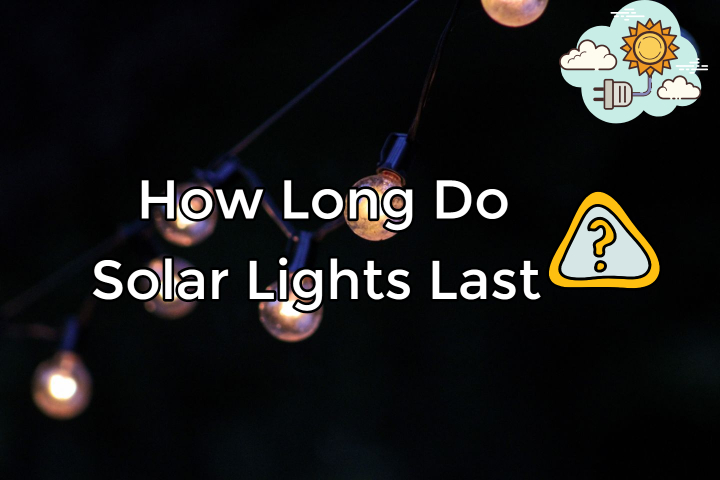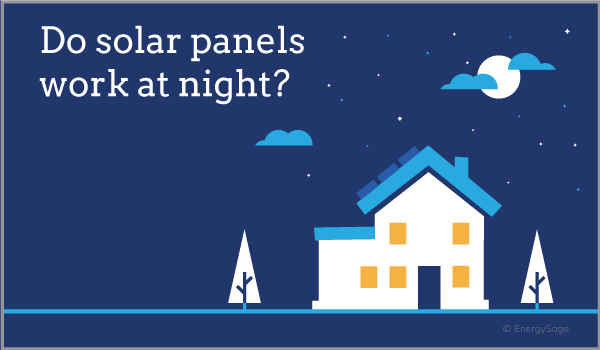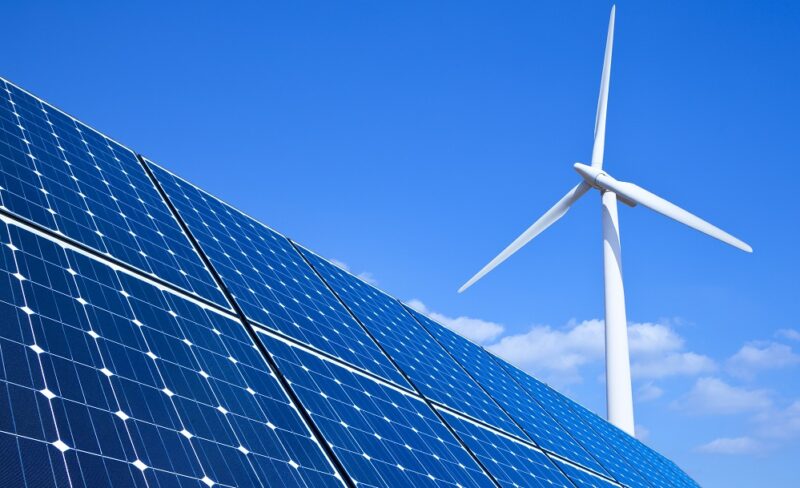Maintaining electronics charged in remote areas can be difficult, whether you’re organizing a road trip, sailing excursion, beach getaway, or camping trip.
Solar energy is a great, environmentally friendly option for recharging while on the go, but conventional panels are large and made to be fixed in one location. You can easily dangle your toes in the solar power waters thanks to portable panels. But a lot of portable solar panels that are strong, light, and made to withstand the elements are now readily available. They are also small enough to store away for use in the event of an emergency power outage.
To find the best portable solar panels, we combed through a range of goods. Keep reading!
Table of Contents
Best Portable Solar Panels List
- 1. BLUETTI PV200 200W Solar — Best Overall
- 2. Renogy 100W Foldable Solar Suitcase with Voyager — Best Value
- 3. SunGold Power 200W Solar Panel — Best for Off-Grid Life
- 4. EcoFlow 110W Solar Panel — Best Design
- 5. Jackery SolarSaga 100W Solar Panel — Most Versatile
- 6. Renogy 100 Watt Eclipse Monocrystalline Solar Panel — Best for Cloudy Weathers
- 7. Renogy 50 Watt 12 Volt Flexible Monocrystalline Solar Panel — Best for Limited Space
- 8. Goal Zero Nomad 28 Plus Solar Panel — Best for Hikers
- 9. GoSun SolarPanel 30 — The Featherweight
- 10. Goal Zero Boulder 100 Solar Panel Briefcase — the Toughest
- 11. Zamp Solar Panels — Best Portable FoldingSolar Panel
Best Portable Solar Panels Reviews
1. Bluetti PV200 200w Solar — Best Overall

Because of the Bluetti AC200P solar generator, I’ve been forced to become a fanboy of Bluetti.
These PV200 200W solar panels were the obvious choice when I was looking for dependable solar panels for my AC200P.
Since my generator required 2400Wh of power, I wanted my portable solar panels to produce more power. My expectations were not disappointed by the Bluetti PV200 200W solar panels.
I can charge my Bluetti AC200 power station to 100% in less than 3 hours with 4 of these 200W panels. And the capacity there is roughly 2400Wh.
I initially intended to choose the SP200, but they were sold out.
I can charge my power station using these portable solar panels even in less-than-ideal weather thanks to their high conversion rate (23.4%) and anti-scratch ETFE coating.
I’m no longer concerned about a sudden downpour of rain because of their rating for water resistance.
Pros
- 200 watts of output power
- Fully portable
- Anti-scratch material
- Ideal for any weather conditions
Cons
- No direct USB charging
- Slightly heavy
2. Renogy 100W Foldable Solar Suitcase With Voyager — Best Value

If you want an all-in-one solution, the Renogy 100W Solar Suitcase is the best choice.
In addition to the foldable panels and connectors, this package includes the Voyager Charge Controller, which has an LCD screen with a backlight.
This essentially means that you can charge any type of 12V battery directly because the controller allows you to select the battery type with just a few clicks.
To keep your battery in good shape, the solar charge controller is also equipped with a variety of intelligent protection features.
Renogy’s 100W Foldable Solar Suitcase is an offer you simply can’t pass up if you don’t intend to purchase a power source.
The Bluetti and Jackery portable folding solar panels are nearly twice as heavy, but they only produce 100W, which is only half as much power.
Pros
- Comes with a charge controller
- Comes with Alligator clips with a fuse
- Protective suitcase
- Compatible with different battery types
- Adjustable aluminum foot-stand
Cons
- Only 100 watts of solar power
3. Sungold Power 200W Solar Panel — Best For Off-grid Life

When mentioning “portable solar panels”, most people think of flexible solar panels that you can fold up into a self-contained protective case and, when needed, deploy within seconds in a new location.
On the other hand, a large portion of our readers is RV and off-grid enthusiasts who prefer a more long-term solar solution for their rigs or cabins.
SunGold Power 200W solar panels are the best option if you want to install them on your RV roof and leave them there.
Despite having rigid, weather-resistant aluminum frames, these panels are still regarded as portable due to their weight and simplicity of installation.
The pre-drilled holes in these portable solar panels allow you to fix them however you see fit; you don’t need a complicated roof mount.
The drawback is that you won’t be able to move them around very easily to position them where they will receive the most sunlight.
Pros
- 200 watts of solar charging
- All-weather design
- Great for extended outdoor use
Cons
- Not fully portable
- No direct USB charging
- Cables and connectors not included
4. Ecoflow 110W Solar Panel — Best Design
Portable, foldable, and compact, this monocrystalline solar “portfolio” not only looks smart but also delivers — with a solar conversion efficiency of 21-22%.
With a seamless, one-piece design and IP67-rated dust and water protection, EcoFlow will see you through your adventure whether you’re looking for simple-to-install portable solar panels for an RV, hiking, or camping.
The integrated carrying case can be used as a kickstand and is somewhat flexible.
Now, this solution appears elegant, but in my experience, it isn’t very stable. Like the eyelets on the SolarSaga 100W solar panel, I’d like to see more anchor points or eyelets.
For two straightforward reasons—110 watts of solar power and a 12-month warranty, respectively—these portable solar panels somehow missed the top three.
Pros
- Premium look and fee
- Lightweight
- IP67 rated for water and dust
Cons
- Only 110 watts of solar power
- No anchoring eyelets
- Only 12 months warranty
5. Jackery Solarsaga 100W Solar Panel — Best Versatile

If an old adage “Jack-Of-All-Trades” can be applied to portable solar panels, it would best describe the versatile SolarSaga 100W from Jackery.
This 100-watt solar folder is perfect for outdoor life but also useful in power outages. Store it somewhere with your survival gear, strap it to the roof of your RV, or put it in your trunk.
Similar to its larger 200W counterpart, this solar panel has nice features like anchoring eyelets and USB-A and USB-C outputs.
This is a great option to have if you suddenly need to charge your phone or Macbook; no battery or power source is required.
The Solar Saga 100W, on the other hand, also has the same flaw as its bigger brother: it is only compatible with Jackery power plants.
Pros
- Lightweight
- Direct USB-A and USB-C charging
- Durable yet soft materials
Cons
- Only 100 watts of solar charging
- Not waterproof
- Compatible only with Jackery power stations
6. Renogy 100 Watt Eclipse Monocrystalline Solar Panel — Best For Cloudy Weathers

In terms of specs, the Renogy 100 Watt 12 Volt Monocrystalline solar panels and the Renogy 100 Watt Eclipse solar panels are very comparable.
But Eclipse offers something unique; it may be the best solar panel for low light conditions. Furthermore, given that German engineering is known for its dependability, the panels are also made in Germany.
Pros
- Comes with a charge controller and Alligator clips
- Impressive low-light performance
- Great build quality
- Protective suitcase
- Compatible with different battery types
Cons
- Only 100 watts of solar power
7. Renogy 50 Watt 12 Volt Flexible Monocrystalline Solar Panel — Best For Limited Space
This option on the list today—a tiny 50W solar panel—might seem odd.
However, portability is the main focus of this list, right?
Even more, flexibility is the best part!
Let’s now concentrate on the reason I adored these little creatures: they excelled in low-light situations, much like the Renogy Eclipse solar panels, which is why I loved them.
Additionally, its 2.87 lb weight makes carrying it around a breeze. Since they are less than 2 feet wide, you wouldn’t even need a truck to transport them.
For a fantastic camping trip, combine it with something like the Renogy Phoenix 300 (as I did).
Just bear in mind that this is a 50W panel with limited applications.
Pros
- Ultra-compact and lightweight
- Budget-friendly
- IP65 rating against water and dust
- Great low-light performance
- Pre-drilled fastening holes
Cons
- Only 50 watts of solar charging
- Not suitable for batteries/generators with high capacity
8. Goal Zero Nomad 28 Plus Solar Panel — Best For Hikers

I recently camped in a bivouac with my girlfriend in France.
We were discussing how convenient it would be to have a few foldable solar panels that we could attach to our backpacks or the curved roof of our tent one day while we were sitting outside.
The Goal Zero Nomad 28 Plus is essentially what we were describing at the time.
When folded, this useful little solar panel has the dimensions of a 12-inch tablet and can be used almost anywhere.
There are numerous mounting options available thanks to the Nomad 28’s four segments of monocrystalline solar panels and ten strapping eyelets that are revealed when it is unfolded.
These portable solar panels, like the GoSun 30, are solely intended for directly charging your smartphones, tablets, cameras, and other USB devices. They will not, however, power your microwave or television.
Pros
Very lightweight
10 anchoring points
Cons
- Only 28 watts of solar charging
- Only the USB charging option
- Needs 2 AA batteries to work
9. Gosun Solarpanel 30 — The Featherweight
Not everyone wants portable solar power for their RV or an off-grid cabin. The concept of portability has a much deeper meaning for some people.
They intend to throw their solar panel into a backpack and start hiking.
My go-to lightweight travel option is the GoSun SolarPanel 30. My smartwatch and phone are the only items I need to charge in those circumstances.
And that’s exactly what this GoSun does: open it, point it at the sun, and plug your phone in.
Of course, I can charge anything that runs on batteries: LED light,
These portable solar panels may not be the best for use in RVs, but they are excellent for beach parties or camping, especially when coupled with a power bank.
Pros
- Very lightweight
- Direct USB charging + 18V DC port
Cons
- Only 30 watts of solar charging
- Not ideal for RV and off-grid living
- No kickstand
10. Goal Zero Boulder 100 Solar Panel Briefcase — The Toughest
There isn’t really a name I could come up with for this portable solar panel.
Like something you’d expect to see in a Michael Bay film, the Boulder is made to be a self-contained, tough, and resilient briefcase.
I mean, tempered glass is not something you’d expect from a
The two 50-watt monocrystalline solar panels are attached by a reliable hinge, and the integrated kickstand enables you to adjust the solar panel’s optimal angle of inclination.
As if reinforced aluminum and corner protection weren’t enough, the panels are also covered in tempered glass.
That being the case, why is this solar-panel tank listed last?
First of all, its range of use is quite small. To strap it to your boat or RV would require some creative thinking.
You can’t install it flush against any curved roof or surface because of its rigid construction. Although you can always use the kickstand, there isn’t much you can do if the ground is wet and soft.
In the end, it becomes too heavy to move. The end-of-the-world suitcase design is outclassed ironically by this one.
Pros
- Very sturdy design
- Top-notch build quality
Cons
- Only 100 watts of solar charging
- Limited mounting options
- Too bulky for carrying around
- No direct USB charging
11. Zamp Solar Panels — Best Portable Foldingsolar Panel
Some of the best folding portable solar panel systems that money can buy are made by Zamp. However, they are not cheap.
Costs for Zamp portable solar power suitcases can be double those of Renogy portable systems. Are they worth it?
We just give you the information about these solar panel kits; the choice is yours. Zamp does provide the widest selection of panel wattage options.
Pros
- Monocrystalline solar panel cells
- Made in the USA
- Waterproof PWM solar charge controller
- Widest selection of wattage ratings
Cons
- Pricey
Factors To Consider When Buying A Portable Solar Panel
Power Output
When purchasing a panel, think about the price you’ll be charging to determine the size panel you’ll require. Larger devices, like coolers, require a larger panel (and typically a battery to store that energy), whereas smaller devices, like phones, can get by with the 15-watt panel just fine. The wattage refers to the DC output’s maximum level under ideal circumstances, but keep in mind that cloud cover may prevent it from reaching that level.
Size And Weight
The size and weight of your solar panel are crucial considerations depending on how you’re traveling and the storage space you have available when not in use. Many of the panels can be folded into portable cases, but if space is at a premium, you might need something even smaller. Despite possibly being lighter, panels with nylon exteriors might not be as sturdy as those with metal frames. You might be better off purchasing a portable solar lantern if all you need to do is power lights and don’t need to charge any electronics.
Durability
You’ll need something that is strong, weather-resistant, and small enough to be easily stored and transported because you probably plan to take the panel with you when you travel (or at least move it around the yard). The lighter the panel, the better if you’re hiking and carrying your gear on your back. Keep in mind the kind of travel you’ll be doing. The durability of the panel is largely dependent on its heavy-duty latches, rust-resistant construction, protected glass, and reinforced components.
Device Compatibility
Finally, consider the devices you want to use your solar panels to charge and make sure they are compatible with your solar panels. In that case, you might need to purchase extra cables or adapters. Many of these panels are made to work with batteries and power banks produced by the same company.
Portable Solar Panel Use Cases
You’ll be able to choose the best option based on how you intend to use your portable solar panels.
The good news is that there are now a ton of fantastic portable options available if, like me, you enjoy RVs. The right portable solar panel kit can supply all of your RV’s electrical requirements, including those for the TV and kitchen appliances.
If you go camping, how will you power your phone and camera?
For the best exposure, choose soft-lined, foldable solar panels that you can fasten to the top of your tent.
You have two options when it comes to boats: foldable or rigid frame. The most crucial thing is to pick a product with IP67 protection that can withstand a few splashes and even a dip.
How Much Wattage Should You Choose?
How you intend to use your portable solar panels will be directly impacted by the wattage.
Let’s make things clear from the start — if you want to power the appliances and lighting in your RV or off-grid cabin, skip the cheap portable solar panels and look to 100W and 200W products.
What is the required total wattage then?
On the bottom label, you can find the specific power consumption of each electric appliance.
For instance, you’ll need three 200W solar panels if you want to power a 500W refrigerator.
There are times when the sun is not at its best. The output of your solar panels is also impacted by dust, temperature changes, and shading. You should therefore always choose a wattage that is greater than what you actually require.
I always advise using a charge controller or power station to run your appliances, no matter what. Up next, more on that
Our Verdict
After much consideration, in my opinion, the best portable solar panel for your money is the Bluetti PV200 200W Solar Panel, followed closely by the Renogy 100W Solar Suitcase and Renogy 100 Watt Eclipse Solar Panel.
The Bluetti PV200 is compact and foldable but gives me 200 watts of solar power.
However, it is the lightest of the 200-watt solar panels on the list in terms of weight. This is why my PV200 solar panel gets used more than any other – for boating, RVing, camping, you name it.
Additionally, it has an anti-scratch coating and is water-resistant, making it not only perfect for any weather but also much simpler to clean.
The Bluetti PV200 is powerful, compact, and impervious to the elements — everything A portable solar panel is I ever ask for.
Frequently Asked Questions
How Should Portable Solar Panels Be Used?
In addition to charging batteries or solar generators, portable solar panels can be used to directly recharge electronic devices. When the sun is out, some panels can be directly connected to phones or other small devices for charging (panels must be angled toward the sun). Direct solar charging, though, can be unpredictable. It is best to use a solar panel to collect energy, store it in a battery (such as a solar controller, battery pack, or charge station), and then connect devices to that—particularly with stronger panels.
What Can A Solar Panel Of 100w Power?
Small electronics like cell phones, tablets, laptops, portable speakers, lamps, and fans can all be powered by a 100W solar panel.
Can Solar Panels Still Generate Electricity Without Sunlight?
Yes, solar panels continue to generate electricity on cloudy days. However, not as much as on sunny days. Solar panels perform best when they are directly exposed to sunlight.
Read More: Do Solar Lights Need Direct Sunlight?
Can You Use Portable Solar Panels In The Rain?
The majority of portable solar panels are weather- or water-resistant, which means they can be left outside in light rain but shouldn’t be submerged underwater. Not every portable panel, though, needs to be left outside all the time. To ensure that the panel will satisfy your needs, check with the manufacturer.
How To Install 100w Solar Panel?
You can skip the installation process if you purchase a portable solar panel with a kickstand, like those made by Jackery or Twelseavan. Simply place it outside in full sunlight.
To make installation simpler, pick a panel like Renogy that has pre-drilled holes if you’re only buying one.


